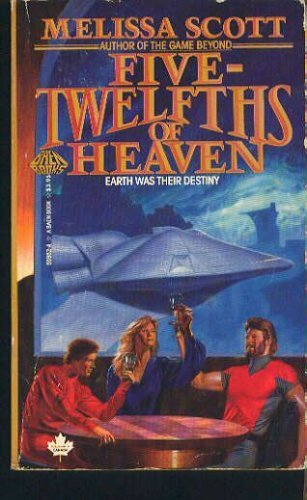
 Five-Twelfths of Heaven by Melissa Scott
Five-Twelfths of Heaven by Melissa Scott
The first volume of Melissa Scott‘s highly-regarded Roads of Heaven trilogy is an unusual SF novel in that it treats indistinguishable-from-magic science pretty much as if it were magic. It’s the sort of thing that makes scientific purists (and guys like me) roll our eyes much of the time. If I have a pet peeve, it’s when a “science” fiction story hits me with paranormal, unscientific concepts. If that’s what you want to write, then just write paranormal fiction. Scott avoids the claptrap trap, however, by defining her ground rules — precisely how these arcane concepts work within her milieu — early on in her story and then assiduously following them. The end result is an imaginative, compelling story for which even hard SF devotees shouldn’t have trouble suspending disbelief. Throw in a believable trio of protagonists, solid space opera action, and some surprising social relevance many years after its original publication, and you have a book, and a trilogy, worthy of rediscovery.
We open many centuries into the future. Humanity has spread out to the stars and lost touch with Earth. A new “physics” has been discovered by the mages of the oppressive Hegemony. It allows for faster-than-light travel via the manipulation of “harmonics” — spaceships are literally powered by sound. Silence Leigh, a rarity as a female pilot, navigates her ships not by plotting mathematical coordinates, but through interpreting symbols and “tuning” her vessel accordingly so that it passes successfully into “purgatory” (hyperspace) in an attempt to reach “heaven.” “Heaven” and “hell” are terms that refer to other, non-material planes. The book’s title actually refers to the velocity of her vessel, the Sun-Treader.
Why would Scott would bother making up something like this and is it, in fact, a self-indulgent way of cheating the science? Who cares? If SF isn’t a literature that allows for even the most outlandish flights of imagination, then nothing is. As long as you obey your own rules, you’re gold. Doubts about the story are assuaged as the novel progresses and the power of the magi plays an integral role in the storyline. Ultimately, it’s all kind of neat: an effective way of blending SF and fantasy elements in the kind of space opera setting where hard science might clash too greatly. Still, Scott does tend to write her passages concerning the magecraft with a hard SF writer’s slavish attention to detail. The resulting prolixity makes some of the novel’s early chapters slow going.
Silence is on the planet Secasia, trying to avoid being defrauded of her inheritance following the death of her grandfather. Under the Hegemony, women have few rights (and on Secasia, even have to go veiled, an element that caught me as suprisingly relevant, as I began reading this book late in 2001 following the U.S. strikes against the Taliban in Afghanistan). But she is saved from her legal problems by off-worlder Denis Balthasar and his crewman, Chase Mago. Balthasar offers Silence an arrangement: Chase cannot get the proper documentation to travel deeply within Hegemon space. But, under the laws of Balthasar’s home world of Delos, Silence can marry both men, enabling Chase to get his papers. (The LGBT subtext is intriguing in its subtlety.) In return for this purely-business arrangement, Silence gets the chance to leave her dead-end life and conniving relations on Secasia and find whatever piloting work she can on Delos, where they’re more progressive about women pilots in general. She agrees, but soon learns to her alarm that Balthasar and Chase haven’t told her everything that they are up to.
Scott’s quasi-mystical concepts do invite comparison to, say, the Jedi Knights and other fantastical Lucas-y stuff-and-nonsense. Of course, Scott’s storytelling has a level of adult sophistication beyond that of Lucas’s escapist juvenilia. The strongest element here: a trio of excellent protagonists, none of whom is too arch, and all of whom, especially Silence, ring true as flawed but sympathetic and convincing people (though of the three Balthasar could have used much stronger development). Scott’s writing is dense and rich in detail, its only notable flaw her aforementioned tendency toward heavy technical exposition. The tale is generally humorless, too — not that I’d have wanted obligatory scenes of inane comic relief, but it’s all quite serious going and Scott doesn’t allow us much in the way of lighthearted moments.
Still, Five-Twelfths of Heaven is most rewarding, and an impressive launch to what promises to be a top-flight trilogy. Space opera for grown-ups — that’s my idea of heaven.
This review by Thomas M. Wagner is reprinted from his website SFReviews.net by special arrangement.
Roads of Heaven — (1985-1987) With Lisa Barnett. Publisher: THE MAGI HAD MASTERED THE NEW PHYSICS and harnessed the newly discovered power of the elemental harmonies — Alchemy. In doing so, they changed the facr of technology for all time. But it was pilots like Silence Leigh who conquered the starlanes. Silence herself dreamed of a ship — a ship of her own and a destiny removed from the Hegemony’s oppression. But not untill she joined the crew of the Sun Treader did the dream take on reality… and a destiny never imagined became Silence’s own as well.





Thanks for the review! I read a bunch of Mellisa Scott novels in the 90’s (Shadow Man, Trouble and her Friends, and a few others whose title I don’t remember) but never read this series. Shadow Man is still one of my favorite SF novels.